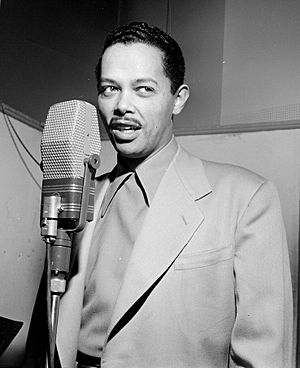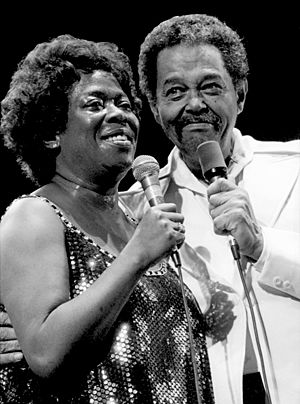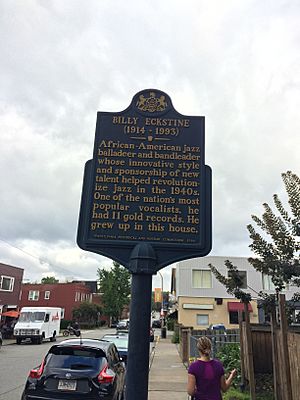Billy Eckstine facts for kids
Quick facts for kids Billy Eckstine |
|
|---|---|

Eckstine in New York City c.1946
|
|
| Background information | |
| Birth name | William Clarence Eckstein |
| Born | July 8, 1914 Pittsburgh, Pennsylvania, U.S. |
| Died | March 8, 1993 (aged 78) Pittsburgh, Pennsylvania, U.S. |
| Genres | Jazz |
| Occupation(s) | Musician |
| Instruments | Vocals, valve trombone, trumpet, guitar |
| Years active | 1939–1990 |
| Associated acts | Dizzy Gillespie, Charlie Parker, Ray Vasquez, Sarah Vaughan |
William Clarence Eckstine (born July 8, 1914 – died March 8, 1993) was an American jazz and pop singer. He also led a famous band during the swing and bebop music eras. People knew him for his deep, powerful voice. In 2019, Billy Eckstine won a special Grammy Lifetime Achievement Award after he passed away. This award is for performers who made amazing music that helped shape recording history. His song "I Apologize" (from 1948) also received a Grammy Hall of Fame Award in 1999. The New York Times newspaper called him an "influential band leader." They said his smooth, strong voice inspired many other singers like Johnny Hartman and Sarah Vaughan.
Contents
Billy Eckstine's Early Life and Education
Billy Eckstine was born in Pittsburgh, Pennsylvania, in the United States. His father, William Eckstein, was a chauffeur, and his mother, Charlotte Eckstein, was a seamstress. Billy's grandparents were William F. Eckstein and Nannie Eckstein. William was born in Prussia (Germany), and Nannie was born in Virginia.
Eckstine went to Peabody High School in Pittsburgh. Famous people like artist Romare Bearden and dancer Gene Kelly also went there. After high school, he moved to Washington, D.C.. There, he attended Armstrong High School, St. Paul Normal and Industrial School, and Howard University. He left Howard University in 1933. This was after he won a talent show by imitating Cab Calloway singing a nursery rhyme.
Billy Eckstine's Music Career
Billy Eckstine moved to Chicago, Illinois. In 1939, he joined Earl Hines' Grand Terrace Orchestra. He stayed with the band as a singer and trumpet player until 1943. During this time, Eckstine became well-known. This was thanks to the Hines band's popular songs like "Stormy Monday Blues" and his own song "Jelly, Jelly."
Leading His Own Band
In 1944, Eckstine started his own big band. This band became a training ground for many young musicians who would become jazz legends. These included Charlie Parker, Dizzy Gillespie, Miles Davis, Art Blakey, and Sarah Vaughan. The Billy Eckstine Orchestra is known as the first bebop big-band. They had popular songs like "A Cottage for Sale" and "Prisoner of Love." Both of these songs sold over a million copies.
Dizzy Gillespie later said about the band, "There was no band that sounded like Billy Eckstine's. Our attack was strong, and we were playing bebop, the modern style. No other band like this one existed in the world." In 1946, Eckstine also starred in a musical film called Rhythm in a Riff.
Becoming a Solo Star
Eckstine became a solo performer in 1947. His solo records often featured rich, complex music. Even before he stopped leading his band, Eckstine recorded solo songs to help support it. He had two huge hits in 1945 with "Cottage for Sale" and "Prisoner of Love." These songs were much more successful than his band recordings.
Eckstine went on to have over a dozen hit songs in the late 1940s. He signed with the new MGM Records label. He quickly had hits with songs like "Everything I Have Is Yours" (1947), "Blue Moon" (1948), and "Caravan" (1949). He also had success in 1950 with "My Foolish Heart" and in 1951 with "I Apologize."
In 1950, Eckstine performed at the Paramount Theatre in New York City. He attracted a larger audience than Frank Sinatra did at his own performance there.
Facing Challenges
In 1950, Life magazine published a three-page story about Eckstine. A photo in the magazine showed Eckstine with a group of white female fans. One fan had her hand on his shoulder and her head on his chest. This photo caused a lot of discussion and some people protested.
Singer Harry Belafonte later said that when the photo was published, "it was if a barrier had been broken." However, the controversy also made things harder for Eckstine's career. Singer Tony Bennett said, "It changed everything... Before that, he had a tremendous following... and it just offended the white community."
In 1951, Eckstine performed at the Cavalcade of Jazz concert in Los Angeles. He also recorded a duet with Sarah Vaughan, "Passing Strangers," which was a minor hit in 1957.
Eckstine continued to record albums in the 1960s and 1970s. His last recording was the Grammy-nominated Billy Eckstine Sings with Benny Carter in 1986. He also appeared as an actor in the TV show Sanford and Son and in films like Let's Do It Again. He sang "The Star-Spangled Banner" before a baseball game in his hometown of Pittsburgh in 1979.
Fashion Icon
Billy Eckstine was also known for his style. He was famous for his "Mr. B. Collar." This was a high, rolled collar that looked like a "B" when worn with a Windsor-knotted tie, or even without a tie. Many stylish people in the late 1940s and early 1950s wore these collars.
Billy Eckstine's Personal Life
Billy Eckstine married his first wife, June, in 1942. After they divorced in 1952, he married actress and model Carolle Drake in 1953. They stayed married until his death. He had four children with Carolle: Ed, Guy, Charlotte, and Gina. All of his children became involved in the music industry.
Illness and Death
In April 1992, Billy Eckstine had a stroke while performing in Salina, Kansas. He never performed again after that. Although his speech got better in the hospital, he had a heart attack a few months later. Billy Eckstine died on March 8, 1993, in Pittsburgh, at the age of 78. His last word was "Basie."
A special historical marker was placed at 5913 Bryant Street in Pittsburgh. This marks the house where Eckstine grew up.
Tributes to Billy Eckstine
Many famous musicians spoke about Billy Eckstine's talent. His friend Duke Ellington wrote in his autobiography that Eckstine's love songs "opened new lines of communication." He also said Eckstine's style was "the essence of cool." Ellington was proud when Eckstine's recording of "Caravan" helped him become famous worldwide.
Sammy Davis, Jr. often imitated Eckstine in his performances. Eckstine was also a pallbearer at Davis's funeral in 1990.
Quincy Jones said in Billboard magazine, "I looked up to Mr. B as an idol. I wanted to dress like him, talk like him, pattern my whole life as a musician and as a complete person in the image of dignity that he projected." Jones also mentioned that as a Black man, Eckstine faced challenges in the 1950s. He said, "If he'd been white, the sky would have been the limit."
Lionel Hampton called Eckstine "one of the greatest singers of all time." He added, "We were proud of him because he was the first Black popular singer singing popular songs in our race... He was our singer."
Images for kids
See also
 In Spanish: Billy Eckstine para niños
In Spanish: Billy Eckstine para niños
 | DeHart Hubbard |
 | Wilma Rudolph |
 | Jesse Owens |
 | Jackie Joyner-Kersee |
 | Major Taylor |




